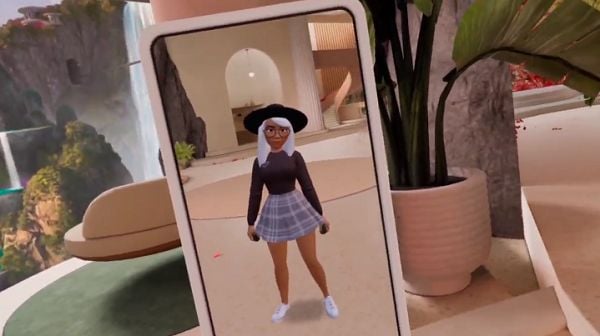A big update in Meta’s latest release notes for Quest v57, with its VR avatars finally getting legs, which are now in public testing.
As you can see in this image, shared by UploadVR (via VR researcher lunayiann), Meta’s VR characters are finally getting legs, so they’ll no longer look like digital genies floating around in the virtual space.
Meta’s lack of legs in VR has been a much-criticized element, with the half-avatars taking many users out of the interactive experience.
At the same time, legs are obviously difficult for Meta to simulate, because its VR headsets don’t include leg sensors of any kind, so it has no way of tracking actual leg movement.
To solve for this, Meta’s developed a new process, called QuestSim, which uses AI to estimate what your legs are doing as you engage in the VR activities, by taking cues taken from the movements that it can track, via your arms and head, to guess where your legs are placed at any given time.
Which seems like probably not the best way for Meta to be investing its AI resources, but again, it has been a major point of contention for many users, and with Meta also looking to expand Horizon Worlds access to mobile devices, the need for legs has become even more pressing.
That’s because, as you can see in this example screen above, the character depictions via the mobile Horizon app do have legs, as they’re not based on VR headset interaction.
Meta’s hope is that by opening up Horizon access to mobile users, that will bring even more people into its next-level social space, and in particular, that it’ll bring gamers into its VR world, which could then become a key bridge to guide users into its metaverse experience.
The metaverse concept hasn’t really caught on as yet, but as more advanced games and other tools get released, interest is growing. And if Meta can invite mobile, non-VR users into the action as well, that could then inspire more people to also invest in its next-level vision.
And strangely enough, digital legs have become a key sticking point in all of this, which is why the addition of legs in VR is likely a lot more significant than you might expect.
Meta’s launched the first stage of testing for its VR character legs, which are only viewable in third-person perspective at this stage. But they are coming, addressing this key concern for its virtual space.
On another front, Meta’s also expanding its parental supervision tools, and introducing time limits in Horizon Worlds. Meta also recently lowered the age limits for users engaging in VR.



